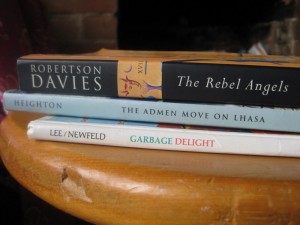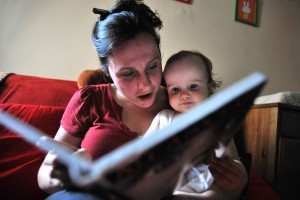February 5, 2012
Our Saturday Morning Book Crawl
On Friday, I read about the opening of Sellers & Newal, a new bookstore on College Street, and then hatched a plan for a Saturday morning book crawl. In order to make a “Saturday morning book crawl” attractive to my husband, I mapped out a route that involved stopping at Sam James Coffee Bar, and breakfast at the Lakeview. It was a sunny, gorgeous morning and felt just like springtime. The walk down to Dundas and Ossington was particularly lovely because we hadn’t seen the sun in ages.
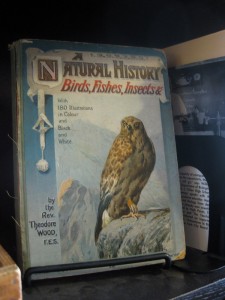 After breakfast, we walked west on Dundas to The Monkey’s Paw, where I’d never been before but had heard so much about. It’s a bookstore of secondhand curiosities, and if we hadn’t had a monster child in tow (with a case of the “nearly-threes”), we could have browsed for ages. Highlights included vintage cookery books, a wall of Penguins, Toronto-health pamphlets on
After breakfast, we walked west on Dundas to The Monkey’s Paw, where I’d never been before but had heard so much about. It’s a bookstore of secondhand curiosities, and if we hadn’t had a monster child in tow (with a case of the “nearly-threes”), we could have browsed for ages. Highlights included vintage cookery books, a wall of Penguins, Toronto-health pamphlets on 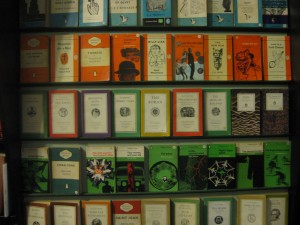 baby-rearing from the ’40s, a book by Shari Lewis on making puppets and several old typewriters whose Hs Harriet wanted to press. Old atlases, books about UFOs, goatherding and sex. The air was marvelously redolent with dustiness and books— “something smells funny in here,” was how Harriet so charmingly put it as soon as we walked in the door. I ended up getting a copy of Dennis Lee’s Garbage Delight, which I’d never read before but it turns out to be the best of all wonderful his picture book. (My favourite poem inside is “Worm”.)
baby-rearing from the ’40s, a book by Shari Lewis on making puppets and several old typewriters whose Hs Harriet wanted to press. Old atlases, books about UFOs, goatherding and sex. The air was marvelously redolent with dustiness and books— “something smells funny in here,” was how Harriet so charmingly put it as soon as we walked in the door. I ended up getting a copy of Dennis Lee’s Garbage Delight, which I’d never read before but it turns out to be the best of all wonderful his picture book. (My favourite poem inside is “Worm”.)
 Then we went to the new store, Sellers & Newal, and I browsed while Harriet (who had decided she wouldn’t wear shoes) was held captive in her stroller, and read to from Garbage Delight by her father. So many cool books here, and not much dust because the store is brand new (as well as bright and airy). Lots of good Canadian fiction, books on advertising, typography and graphic design, a set of Andrew Lang’s Fairy Books, affordable paperbacks, collectable hardcovers, and a shelf that was built out of a coffin. Oh my! I was happy to get a copy of Steven Heighton’s essay collection The Admen Move on Lhasa.
Then we went to the new store, Sellers & Newal, and I browsed while Harriet (who had decided she wouldn’t wear shoes) was held captive in her stroller, and read to from Garbage Delight by her father. So many cool books here, and not much dust because the store is brand new (as well as bright and airy). Lots of good Canadian fiction, books on advertising, typography and graphic design, a set of Andrew Lang’s Fairy Books, affordable paperbacks, collectable hardcovers, and a shelf that was built out of a coffin. Oh my! I was happy to get a copy of Steven Heighton’s essay collection The Admen Move on Lhasa. 
And then finally to Balfour Books at their excellent dust-free, light-filled location near College and Bathurst. Which is where my family won the Patience Prize as they sat up at the front near the door (you can see them in the picture) and not once asked me if I was done yet. And because they were so considerate, I did my best to be done as yet as possible. I finally got my hands on a copy of Robertson Davies’ The Rebel Angels, which my friend Patricia has recommended, because she says that those of us who only read Fifth Business in high school don’t know Robertson Davies at all.
And by then it was nearly naptime, so to home. Harriet was wished good dreams, and I curled up on the couch and read and read and read (and knit).
February 2, 2012
The New Quarterly 120: Love is Abroad
 I’m behind on the times because The New Quarterly 121 has just shown up in my mailbox (which was very crowded. Apparently my downstairs neighbour has just taken out a subscription to The New Quarterly). But I still want to write about how fabulous the last issue was.
I’m behind on the times because The New Quarterly 121 has just shown up in my mailbox (which was very crowded. Apparently my downstairs neighbour has just taken out a subscription to The New Quarterly). But I still want to write about how fabulous the last issue was.
It featured the winner of the Edna Staebler Personal Essay Contest, Lisa Martin-DeMoor, whose poetry I reviewed nearly two years ago. Her essay “A Container of Light” did that brilliant thing that great essays do, which is to take something very personal personal and intimate, and shine a light upon that story in such a way that the story becomes one about something much bigger. It is particularly significant that Martin-DeMoor is writing about a miscarriage, about mourning and loss, because how do you tell a story bigger that that? But she does, and it’s beautiful: “How light is always leaping out of darkness, even when a light goes out.”
Catriona Wright’s essay “You Just Put Your Lips Together and Blow” resonated with me for personal reasons– I find the sound of whistling more grating than any other on earth. Wright addresses her own compulsive whistling (and the negative reviews it has received), and also the history and meaning of of whistling cross-culturally: “In Hawaii it is supposed to bring bad luck because it mimics the language of the Nightmarchers, ghosts of ancient Hawaiian warriors.” Totally! Also instances of whistling in pop songs, the wolf-whistle and Emmet Till, and the few remaining professional whistlers out there.
Stephen Heighton’s short story “Dialogues of Departure” was wonderful, the story of a Canadian English teacher in Japan who begins to learn Japanese through a language textbook with sinister undertones. (And it got me thinking about books stories about Canadian/Japanese experience– Heighton’s collection Flights Path of the Emperor, Catherine Hanrahan’s Lost Girls and Love Hotels, Sarah Sheard’s Almost Japanese, and even my short story “Georgia Coffee Star”.) Mark Anthony Jarman’s “Adam & Eve Saved from Drowning” was so incredibly good, Jarman’s mastery of language creating an effect that was as rich and sad as it was funny.
I also enjoyed Sara Heinonen’s “Blue Dress”, the story of a woman as lost in her life as she is in Hong Kong (and it was nice to read Heinonen’s fiction, as I enjoy her blog very much). And then “The Fires of Soweto” by Heather Davidson, and we’re told, “This is her first published story”, and I will tell you that this is what small magazines are for. What an amazing discovery. I suspect we’ll be hearing more from her.
And then if that weren’t enough, they publish two poems by one of my most beloved poets, Kerry Ryan. And another by Susan Telfer, who wrote one of my favourite books of 2010.
Every time I receive The New Quarterly, I have this weird sense that it’s been custom-edited just for my pleasure. It’s one of the great pleasures of my life to be a subscriber.
February 2, 2012
The chief result of the digital revolution
“The chief result of the digital revolution, then, has been to downgrade all art and personal expression to the level of the ephemeral, quickly-consumed and discarded content. In terms of writing this means genre filler: romance (or its seedier cousin porn), suspense thrillers, and supernatural twaddle. What we’re talking about here is the kind of stuff people purchase by the bale, but that nobody wants to have on their bookshelf at home. Not, I might add, out of shame but simply because they don’t think such books are worth keeping.” — Alex Good, “The Digital Apocalypse”, Canadian Notes & Queries 83
January 31, 2012
Stopping for Strangers: by Daniel Griffin
 The stories in Daniel Griffin’s collection Stopping for Strangers are the kind of of stories that will annoy people who think that they don’t like short stories. Those readers who want to know what happens next, who require certain closure, who like a beginning, middle and end. Because Griffin’s stories aren’t so tidily structured, and he’s situated them so that the main action is usually taking place outside of the frame. Inside the frame, what is going on is more subtle, ordinary moments made extraordinary by what we perceive will happen later, but the context is not the point, rather the moments are.
The stories in Daniel Griffin’s collection Stopping for Strangers are the kind of of stories that will annoy people who think that they don’t like short stories. Those readers who want to know what happens next, who require certain closure, who like a beginning, middle and end. Because Griffin’s stories aren’t so tidily structured, and he’s situated them so that the main action is usually taking place outside of the frame. Inside the frame, what is going on is more subtle, ordinary moments made extraordinary by what we perceive will happen later, but the context is not the point, rather the moments are.
There is a rawness to the book’s design which suits it, these stories of characters operating by impulse, living by (barely) wits, leaping before they look, and not always landing on their feet. Many of these are characters whom life happens to, whether due to lack of initiative or stronger (terrible) forces. Half the stories in the book are about sibling relationships, about the unlikelihood of these connections that also happen to us, and the complicated nature of the obligations inherent in these connections. Though just as little choice is exercised by the characters in romantic relationships, many of whom are forced to confront the challenges of parenthood too soon: “The first time I got pregnant, it was like the baby was stealing our youth… And then when I miscarried, it was like we were robbed again, and so I got pregnant again.” Which is the definition of a vicious spiral.
“The Last Great Work of Alvin Cale” was a finalist for the Journey Prize in 2009, and has the most breadth of all the stories in the collection. In less than 20 pages, Griffin evokes decades of history, the life story of a middling artist who is surpassed in both love and talent by his son, and how he uses his son’s death to selfishly fulfil his own means. “Promise” is narrower in its focus, but with great detail and characterization that illuminates what comes before and after, the latter to devastating effect (and ambiguous effect too, which will frustrate some readers, but others will will find engaging). It’s a violent story of loyalty and futility, and why we do what we do even when we know it doesn’t matter.
“Stopping for Strangers” is a remarkable set-up, a brother and sister who stumble into a stranger’s house via an encounter with a hitchhiker and find themselves in the midst of a nightmare (in Trenton Ontario, no less). It’s the kind of story wherein almost nothing happens, but everything nearly does, and the tension is overwhelming. Atmosphere too permeates “Lucky Streak”, which is not as successful as the other stories in terms of narrative, but creates a fantastic sense of place, time, nostalgia and doom. “Mercedes Buyer Guide” is another story in which a car brings unlikely characters together, a 1981 Mercedes with a trunk full of junk and an envelope full of money.
These stories hinge on connections, the moments that are the point of these stories, the “there and then” as opposed to whatever comes next. Subtle gestures that mean more (or don’t), how these connections illuminate the distance between how characters are perceived as opposed to who they think they are, the unbridgeable gaps, and connections so close they’re causing friction– these are the details that tell us everything. And really, this is what a short story is for. Griffin’s will be beheld with great pleasure by readers who already know that.
January 31, 2012
New Featured Ad: Great Plains Publications
I’m pleased to welcome Great Plains Publications to our sidebar. I’d enjoyed reading Nerys Parry’s Man & Other Natural Disasters last month, and so was happy when they approached me about placing an ad on the site. My posts and reviews at Pickle Me This are never paid for and opinions expressed are ever my own, but it is definitely nice to be featuring an ad for a book whose goodness I can stand behind and can recommend wholeheartedly.
January 31, 2012
Packing snow
 Harriet has been lusting after winter for weeks now, but the season really hasn’t delivered. It’s the last day of January, and only now have we received the supply of “packing snow” required for Snow Person construction. But Harriet was ecstatic, and we did have a good time rolling up all the snow in the backyard to make this guy. I explained to Harriet that he would not be long for this world, as our temperatures are tropical today, but I’m not sure that she really understood. “Remember how all the snow melted in Charlie and Lola?” I asked her, but she ignored me, and I really was being a bit of a downer. Though not unnecessarily– I just looked out the window, and our Snow Person is no more. My plan to distract Harriet away from trauma resulting from this situation will involve offering ice cream and chocolate. And it will probably taste better than what I found her eating when I finally dragged her inside (kicking and screaming) for nap time, which was dirty snow out of our garden using a long-abandoned, formerly-buried piece of sidewalk chalk as a spoon.
Harriet has been lusting after winter for weeks now, but the season really hasn’t delivered. It’s the last day of January, and only now have we received the supply of “packing snow” required for Snow Person construction. But Harriet was ecstatic, and we did have a good time rolling up all the snow in the backyard to make this guy. I explained to Harriet that he would not be long for this world, as our temperatures are tropical today, but I’m not sure that she really understood. “Remember how all the snow melted in Charlie and Lola?” I asked her, but she ignored me, and I really was being a bit of a downer. Though not unnecessarily– I just looked out the window, and our Snow Person is no more. My plan to distract Harriet away from trauma resulting from this situation will involve offering ice cream and chocolate. And it will probably taste better than what I found her eating when I finally dragged her inside (kicking and screaming) for nap time, which was dirty snow out of our garden using a long-abandoned, formerly-buried piece of sidewalk chalk as a spoon.
January 29, 2012
The Vicious Circle reads: Skippy Dies by Paul Murray
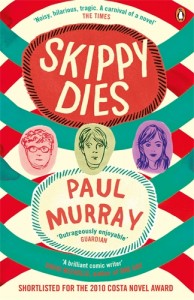 We assembled on Saturday morning around a table spread with enough brunch to feed several Vicious Circles, and quickly got to talking about the book, Paul Murray’s Skippy Dies. We were surprised that so many of us got through it, a hefty tome at 650 pages, a hefty tome whose bleak outcome is made clear by its title, and which became so unbearably sad to read around page 450. We speculated that part of the reason we were able to take our time as we read it was that none of us really wanted to get to the end. And one of us was so angry at the end, the lack of pay-off for investing one’s time in such a long book. “Well, that’s the way the world works,” we said. There are no tidy endings, and Murray deserves credit for making his novel reflect that reality. Though surely the world is not as bleak as the novel presents. There is far more beauty in the world than Murray shows, and in particular we remarked upon him driving home the point that the adults whom our messed-up children are in the care of are even more messed-up than the kids are. The parents in his novel are stereotypes, drunken mothers in jungle prints whose silicone implants’ sloshing is audible. There are good parents out there. Some of us even had them.
We assembled on Saturday morning around a table spread with enough brunch to feed several Vicious Circles, and quickly got to talking about the book, Paul Murray’s Skippy Dies. We were surprised that so many of us got through it, a hefty tome at 650 pages, a hefty tome whose bleak outcome is made clear by its title, and which became so unbearably sad to read around page 450. We speculated that part of the reason we were able to take our time as we read it was that none of us really wanted to get to the end. And one of us was so angry at the end, the lack of pay-off for investing one’s time in such a long book. “Well, that’s the way the world works,” we said. There are no tidy endings, and Murray deserves credit for making his novel reflect that reality. Though surely the world is not as bleak as the novel presents. There is far more beauty in the world than Murray shows, and in particular we remarked upon him driving home the point that the adults whom our messed-up children are in the care of are even more messed-up than the kids are. The parents in his novel are stereotypes, drunken mothers in jungle prints whose silicone implants’ sloshing is audible. There are good parents out there. Some of us even had them.
And speaking of stereotypes, we lamented that Murray did not see fit to instill his female characters with the same depth as the male, to write them with the same sensitivity. At the end of the novel, Lori’s character is given some dimension, but otherwise, the girls were the worst “shit girls say” stereotypes. Which is unfortunate because he writes about the teenage boys and their connections so beautifully, and the novel could have been so much richer if the girls had been half as interesting.
But this is the kind of novel whose approach to its subject matter could be used to explain away several perceived flaws. That we never see the girls in all their dimensions because this is a novel about a boys’ boarding school, and they’re so far removed from the girls’ experience. That the story itself seems dated because the school itself is a relic, as anachronistic as its atmosphere. Though we note that this is very much a novel of the present, and we think the novel is structured along the lines of the video games its characters are so immersed in. We remark that the characters’ trains of thought move seamlessly between the games’ narratives, and the actual world around them. We love so much about the boys at the centre of the story, the richness of their characterization.
A few of us are confused because we heard Paul Murray read at IFOA and were left with the impression that this book was funny, but it was so dark, so bleak. The blurbs and reviews also thought it was hilarious, which makes us think that maybe they didn’t read the book. Also, the novel was sold together in three volumes, and we wondered how we might have understand the book if we’d read it in that format, and that we might have read the first or second, and given up.
We liked the way that this novel spoke about grief, and history, and Ireland, while also subverting and complicating stereotypes on the last point. We thought Howard was ridiculous, sometimes amusingly so, but other times just frustratingly so. We loved the Bethani song lyrics, and when Lori sang into the phone. Some of us thought the glimmer of goodness, of wholeness, that Murray provides at the end of the book was enough. Others thought not so much. Some of us found part two pretty tedious, and the whole druid thing, and the secret room in the girls school, blah blah. Prime time for skimming here, but with the final section of the book, we were hooked again.
Books we talked about when we were talking about this book were The History Boys, This Can’t Be Happening at MacDonald Hall, Special Topics in Calamity Physics, and Susan Swan’s The Wives of Bath (which we think we’re going to putting on our to-be-read list). We were all pleased to have encountered a book we might not have read otherwise, and a book that was so good for discussion, whose flaws made for interesting and illuminating conversation. And then we helped ourselves to another serving of sausage hash browns, and turned our minds to extra-literary things.
January 26, 2012
But every day is Family Literacy Day!
As part of Family Literacy Day, my article “How to read so your kids will listen” is online at Today’s Parent, which I’m quite excited about (though I know I’m not telling any of you people anything that you didn’t know already).
Also check out also a list of expert-curated kids book recommendations up at Canadian Bookshelf.
And even if you caught it first time around, it might be worth revisiting the legendary time I dragged out Family Literacy Day for an entire week back in 2010, because there’s really some excellent stuff up there.
January 26, 2012
Our Best Book of the library haul: Sarah Garland's books
 Still not sure where Sarah Garland has been all my life… An author/illustrator whose texts are not terribly interesting, but whose illustrations are so rich and jumbled with the stuff of every day life. Those of us who adore Shirley Hughes will find much to love in Garland’s “Coming and Going Series,” simple stories of ordinary adventures like going to the local pool, to playgroup, or having friends over for a cup of tea outside (until the rain comes and washes the party away). The houses are untidy, Mums are unravelled and pear-shaped, someone’s always putting on a cup of tea, and they live in a cottage and have an aga! (Yes, be still my English-fetishizing heart.) There is a certain vagueness to the plots which allows little people to project themselves right into the stories, and indeed, Harriet loves these books as much as I do. We’re besotted.
Still not sure where Sarah Garland has been all my life… An author/illustrator whose texts are not terribly interesting, but whose illustrations are so rich and jumbled with the stuff of every day life. Those of us who adore Shirley Hughes will find much to love in Garland’s “Coming and Going Series,” simple stories of ordinary adventures like going to the local pool, to playgroup, or having friends over for a cup of tea outside (until the rain comes and washes the party away). The houses are untidy, Mums are unravelled and pear-shaped, someone’s always putting on a cup of tea, and they live in a cottage and have an aga! (Yes, be still my English-fetishizing heart.) There is a certain vagueness to the plots which allows little people to project themselves right into the stories, and indeed, Harriet loves these books as much as I do. We’re besotted.
–Check out an interview Garland did in The Guardian when her books were republished in 2007.
